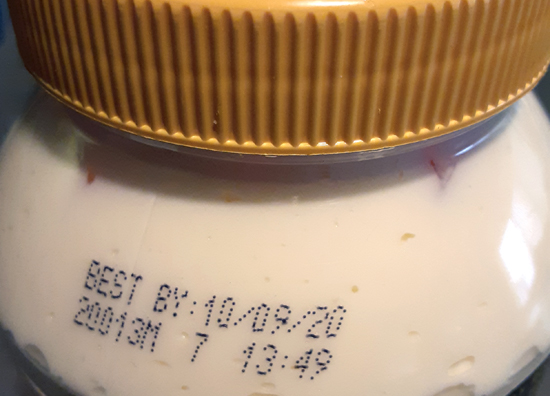
During the current quarantines caused by the exponential threat of COVID-19, I’m seeing a number of people on social media saying they’re cleaning their refrigerators and pantries for the first time in quite some time. I’ve also seen a few people say “if it’s past its marked date, throw it away.” This particular concept is a pet peeve of mine, because it’s honestly incorrect, and is also a large contributor to food waste.
Looking at what’s in your refrigerator, freezer, and pantry, start thinking about food expiration dates. In doing so, remember this from the Food Product Dating page on the United States Department of Agriculture’s Food Safety and Inspection Service web site:
“Except for infant formula, [food] product dating is not required by Federal regulations.”
This follows 9 CFR (Code of Federal Regulations) 381.126 and 431.2(e). Restaurants etc. are required by state and local health departments to both honor package dates, and also to create new dates for both opened and prepared foods, generally a week from opening or preparation. But your pantry is different. The dates you see are educated guesses, but they’re not regulated whatsoever. You don’t know how long something has sat on a loading dock or in an opened truck trailer. You don’t know what the temperature or humidity was on those docks, in refrigerated trailers, storage refrigerators, or even at the store. You may not even know what the temperature is in your own refrigerator. (Ours is 37°F with the door closed at least 30 minutes.)
Most items such as condiments, pickled foods, bottled sauces, frozen foods, canned goods, and similar items can last for a long time, past any date set by when they were opened. As I said, in restaurant kitchens you diligently mark something to be thrown away one week after it was opened or prepared. But trust me, no one does this for the five-gallon bucket of hamburger pickle chips. It’s entirely unnecessary. Those things can easily last for a couple of months after opening.
The following list contains some concepts to follow when evaluating the quality and health of various food items. This isn’t a catch-all list, so you will still need to be careful of the foods you prepare and serve. They’re guidelines, not rules, and don’t cover every possibility.
- Open & Prepared Items: A general rule of thumb when you first open or prepare a food is to mark it with a date one week from when you put it in there. There are exceptions to this, such as condiments, pickles, aged cheeses, butter, etc. These items should be checked regularly for other issues though, such as an expanded lid on a jar of pickles, spots on cheeses, or condiments showing separation in their fluid.
- Canned & Jarred Goods: In the pantry, the strongest indicators for jarred or canned goods that have gone bad is expanded packaging from gases that have built up inside, or rust on the packaging itself. Items showing these properties should be thrown out.
- Refrigerated Items: Sometimes groceries get put into a fridge and stay there for a while without being used. A lot of times it’s easy to see from the appearance, feel, or odor of an item that it needs to be thrown away. This is certainly true of various kinds of produce such as lettuce, celery, carrots, etc. Lunchmeats, hot dogs, sausage and bacon, and other meats that have spent too much time in the fridge may also have unpleasant characteristics. Use common sense when figuring this out, as it’s certainly a case-by-case basis.
- Freezer Items: Freezer burn, graying of meats, and crystalizations are some of the issues with frozen items. Generally these items can still be eaten, but their quality has certainly suffered. It’s better to repack newly-purchased meats and other items in vacuum-sealed bags for longer cold storage.
- Breads & Baked Goods: These items will go stale first, becoming hard, and then mold will begin to grow. Items made more locally with less preservatives will certainly go bad more quickly. It’s best to freeze breads and baked goods, but longer time in a freezer will also affect their quality.
- Baking Supplies, Cereals & Grains, Spices, etc.: In sealed containers these items can last for quite some time. Unsealed, insects can be attracted to them that you may not even see until after preparing the item for a meal. Keep these items stored properly in sealed containers, especially those items you may not use as often.
So … Use.Your.Best.Judgement. You may not want to throw foods out just because a date says so. Open it, use your eyes and your nose, then decide if the item is alright. No one can do that for you. I encourage you to think the quality of the item through, secondary to any date on the product. Your food might last longer.